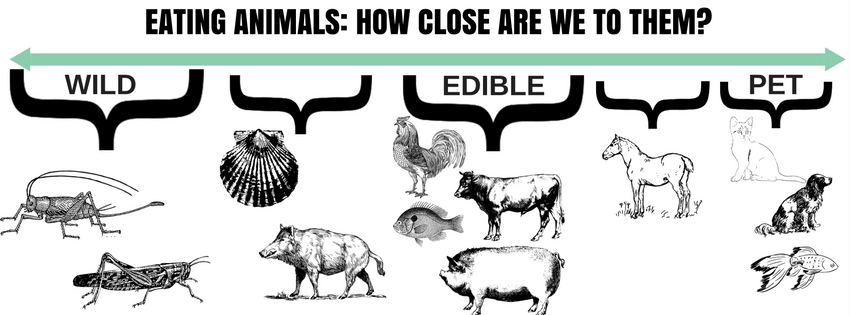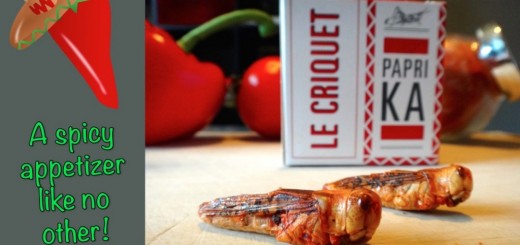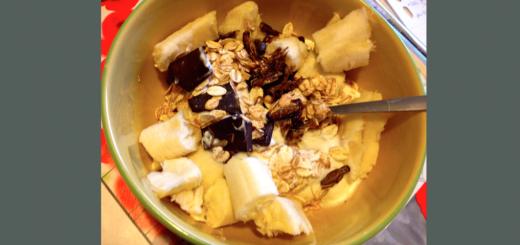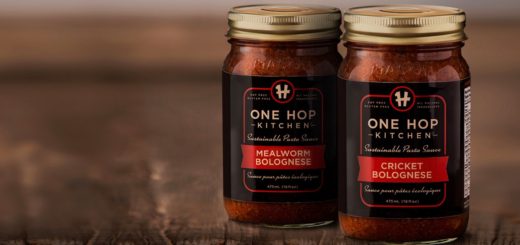Eating animals: how close are we to them?
Eating animals has always raised a lot of questions. Which animals are considered as food or not depend on several factors. In fact, each culture has its own set of rules. The idea of eating insects in the Western countries raise even more questions and opening our mind to eating insects could also open our mind to what’s considered as food.
When speaking about edible insects, the cultural “Yck-factor” we have in Western countries toward eating insects is often put forward. “We don’t insects in our culture”
Which animals are considered as edible or not depend not only on the culture, the location but also on the time period. As an example, one of the reasons we don’t consider eating insects anymore is the sedentarization and the rise of agriculture during the Neolithic period that followed the Paleo. We may start eating soon eating insects again in our countries!
As someone who didn’t eat meat but insects, I was interviewed by the French journal Philosophie Magazine about my relation toward eating animals.
I came across another factor for why we don’t eat insects but other animals in France. This theory was depicted in Claude Fischler‘s book “L’homnivore”. There is a scale on which we classify animals from how close we are to them.
Eating animals: Those we love, those we eat and those we don’t know, hate and fear.

The animals considered edible in France
The picture shows how we can draw this scale regarding the French culture. We have to note that in every culture there are some taboos regarding eating animals.
Even if there are many plants that are not considered edible, there isn’t a taboo for eating certain kind of plants.
This scale can be separated into 3 categories :
- The animals that are too close us to be eaten: Our friends Those animals are our friends, they live in our house, they have names, we know them, they are our pets. In this category, we can also add the monkeys and the especially chimpanzees. Eating chimpanzees could merely be considered as cannibalism.
- The animals that are edible: Our food Those animals are meant to be eaten, they are food. Our culture considers them as the “perfect” distance to be eaten. We know them enough to consider them as food but not enough to give them names and consider them as companions. There is more a utilitarian relationship. In France, this is the cow, fish, pig and chicks. Interesting fact: In the 18th century in France, during its life, the pig was almost considered as a pet and a friend, he got his own name. Before being slaughtered, he was blamed for his dirtiness and lost his name, just as if we wanted to put it back in its place as food.
- The animals we fear, hate and don’t know: The wild Those are all the rest, merely all animals in fact. Whether we don’t know them enough, fear them or hate them, we don’t consider eating animals in this category.
- The grey areas: Are they our friends, are they our food? Even if culture defines which animals we can eat and which we can’t, there are always some personal choices involved. In those categories, everybody draws the lines where she/he wants. Some animals as horses can be considered as food but are friends and companions for others. Boars and deer are wild and “dirty” for some people, delicacies for others. Snails and oysters can be disgusting or delicious! Insects are entering this area!
The paradox of eating animals
The paradox of eating animals has always been present. With the scientific advancements and our relationship with our pets, this paradox is becoming stronger than ever.
Eating animals and which animals to eat is raising more and more questions. Not only for the health or for the environment, but also regarding the ethics.In Western countries, we have always ranked animals placing “Homo sapiens” on top. Because it is our species, but also because we thought that we are different and better than other animals. Humans have, for a long period of time, been seen as more intelligent, having more and stronger feelings and emotions than other animals. More and more research demonstrates that after all, we are just another species of animals. A lot of our brain functions and behaviours are coming from our ancestral reptilian brain. Our sense of “animality” has therefore increased.
For the past 50 years, the pet industry has grown tremendously. Cats and dogs who were our companions and were present for protecting our house and killing mice are now our best friends. They are treated as members of the family. They have names, receive gifts and are sent to the psychologist. We know that cats and dogs have their own personalities, strong feelings and emotions. We see them more as “humans” than before.
At the same time, the development and industrialisation of the meat industry turned farmed animals into objects. Animal welfare associations are raising awareness about this issue. As we are realizing that chickens, pigs and cows are not that different from cats and dogs, the way we treat them is totally different.
There is a big discrepancy between how we treat our pets and our farmed animals and this gap has never been as large. A study has shown that how close are children to their pets is related to becoming a vegetarian later in life.
With this ecosystem, is it possible to raise awareness about eating animals even if they are insects? Yes, indeed… Even among the community of vegetarians and vegans engaged in animal welfare this possibility and idea is far from obscure and may even be positive…
TO BE CONTINUED…
Resources about eating animals
Claude Fischler – L’homnivore (1990)
Personalities on the Plate: The Lives and Minds of Animals We Eat – Barbara King (2017)
Insects as animal food – Hard facts Vs Possible facts – James Mc Williams
Ethical concerns regarding animal use mediate the relationship between variety of pets owned in childhood and vegetarianism in adulthood. (2017) (in Appetite 2017 Dec 7;123:43-48) – Heiss.S & Hormes J.M



